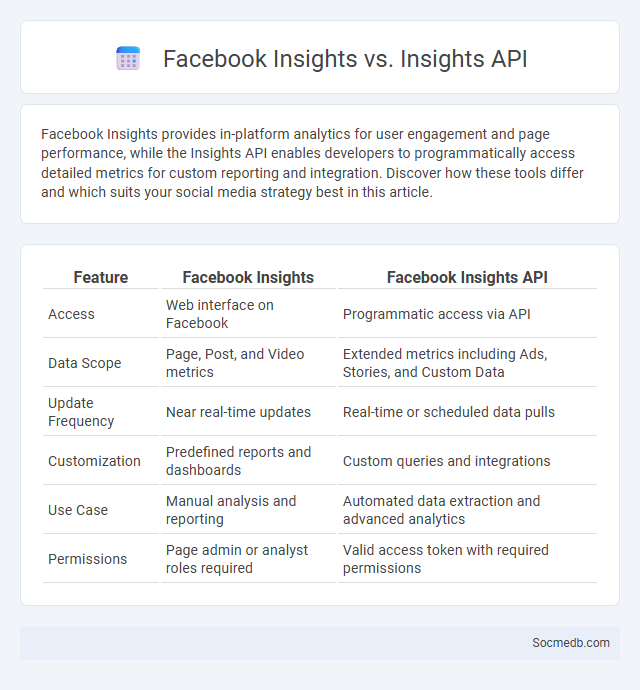
Photo illustration: Facebook Insights vs Insights API
Facebook Insights provides in-platform analytics for user engagement and page performance, while the Insights API enables developers to programmatically access detailed metrics for custom reporting and integration. Discover how these tools differ and which suits your social media strategy best in this article.
Table of Comparison
| Feature | Facebook Insights | Facebook Insights API |
|---|---|---|
| Access | Web interface on Facebook | Programmatic access via API |
| Data Scope | Page, Post, and Video metrics | Extended metrics including Ads, Stories, and Custom Data |
| Update Frequency | Near real-time updates | Real-time or scheduled data pulls |
| Customization | Predefined reports and dashboards | Custom queries and integrations |
| Use Case | Manual analysis and reporting | Automated data extraction and advanced analytics |
| Permissions | Page admin or analyst roles required | Valid access token with required permissions |
Introduction to Facebook Insights and Insights API
Facebook Insights offers comprehensive analytics on your page's performance, user engagement, and audience demographics to optimize your social media strategy. The Insights API enables developers to programmatically access detailed metrics and data, allowing for custom reporting and integration with other tools. Utilizing these resources can help you make data-driven decisions to enhance your content and increase reach.
What is Facebook Insights?
Facebook Insights is an analytics tool designed to help you track, analyze, and optimize your Facebook Page performance by providing detailed data on post reach, engagement, and audience demographics. It offers metrics such as page views, likes, shares, comments, and video performance to help you understand how your content resonates with your audience. Using Facebook Insights enables your business to make data-driven decisions for more effective social media marketing strategies.
What is the Facebook Insights API?
The Facebook Insights API is a powerful tool that provides detailed analytics and metrics about your Facebook page's performance, audience engagement, and content reach. You can access data such as page views, post impressions, demographic information, and user interactions to optimize your social media strategy effectively. Leveraging this API allows your business to make informed decisions based on real-time insights directly from Facebook's platform.
Defining "Insights" in Social Media Analytics
Insights in social media analytics refer to the actionable data derived from analyzing user interactions, engagement patterns, and content performance across platforms like Facebook, Instagram, and Twitter. These insights help brands understand audience behavior, preferences, and trends to optimize marketing strategies and enhance customer experiences. By leveraging metrics such as reach, sentiment analysis, and conversion rates, businesses can make informed decisions to improve their social media impact and ROI.
Key Differences: Facebook Insights vs Insights API vs Insights
Facebook Insights provides detailed analytics directly within your Facebook page, offering metrics like reach, engagement, and demographic data. The Insights API enables developers to programmatically access and integrate this data into external tools, allowing for customized reporting and automation. Your choice between these depends on whether you need user-friendly dashboards (Facebook Insights), raw data integration (Insights API), or a blend of both for comprehensive social media analysis.
Benefits and Limitations of Facebook Insights
Facebook Insights provides businesses with valuable data on user engagement, reach, and demographics, enabling precise targeting and improved content strategies. The platform's real-time analytics help marketers optimize ad spending and measure campaign effectiveness efficiently. However, Facebook Insights has limitations such as data sampling inaccuracies, limited historical data retention, and a lack of granular competitive analysis, which can restrict comprehensive market insights.
Advantages and Drawbacks of Insights API
The Insights API offers businesses powerful analytics tools to monitor user engagement, track performance metrics, and optimize social media strategies for enhanced brand visibility. It enables real-time data access, facilitating data-driven decisions that improve content targeting and campaign effectiveness. However, challenges include potential privacy concerns, API limitations on data granularity, and dependency on platform policy changes that can restrict access or alter available metrics.
Common Use Cases for Each Tool
Facebook excels in building personal connections and community engagement, offering features like groups, events, and marketplace for social interactions and commerce. Instagram focuses on visual storytelling through photos and videos, making it ideal for influencer marketing, brand promotion, and lifestyle content. Twitter serves real-time news updates, customer service, and public conversations, supporting hashtags and trending topics for broader reach and participation.
How to Choose: Facebook Insights, Insights API, or Generic Insights
Choosing between Facebook Insights, Insights API, or Generic Insights depends on Your data needs and technical expertise. Facebook Insights offers user-friendly, in-platform analytics ideal for marketers seeking quick, visual reports. Insights API enables developers to access raw, customizable data for advanced integration and analysis, while Generic Insights provide broader social media metrics applicable across multiple platforms for a comprehensive overview.
Conclusion: Maximizing Social Media Analytics Efficiency
Maximizing social media analytics efficiency involves leveraging advanced tools and AI-driven platforms to extract actionable insights from vast data streams. Your ability to interpret and apply these insights directly enhances targeted marketing strategies, audience engagement, and content performance. Prioritizing real-time data monitoring and integrating cross-channel analytics ensures informed decision-making and measurable ROI growth.
 socmedb.com
socmedb.com